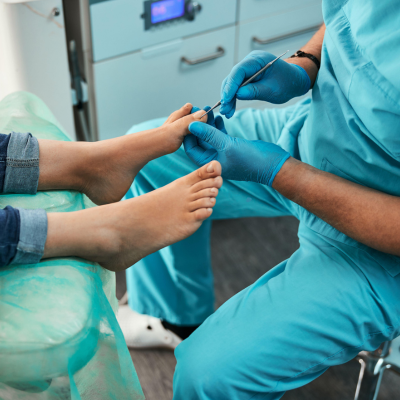27 Jun When Should You See a Chiropodist Instead of Your Family Doctor?

When foot pain, discomfort, or unusual changes in the skin appear, most people naturally make an appointment with their family doctor. While that’s a good initial step, some foot-related problems are better served by a chiropodist, a healthcare professional who specializes in the diagnosis and treatment of conditions related to the feet and lower limbs.
At Etobicoke SportMed& Physiotherapy, some patients we treat have been addressing foot problems for months with general care, only to find out that a chiropodist could have resolved the underlying cause a long time ago. So, how do you know when to bypass the generalist and head straight to a foot specialist?
Let’s break it down.
What Is a Chiropodist?
A chiropodist is a healthcare professional regulated by a province in Canada who deals with the assessment, treatment, and prevention of diseases, disorders, and conditions of the foot and ankle. They are best suited to manage a wide range of issues, such as skin and nail problems, biomechanical issues, orthotics, and minor surgical procedures.
Signs You Should See a Chiropodist Instead of Your Family Doctor
Recurring Foot or Ankle Pain: If rest doesn’t resolve your foot or ankle pain, or if it recurs, a chiropodist can conduct a comprehensive biomechanical assessment and develop a personalized treatment plan for you – such as orthotics or gait correction.
Ingrown Toenails: Your family doctor can prescribe antibiotics, but a chiropodist can safely and effectively remove the ingrown portion of the nail, treat the infection, and help prevent recurrence—often using a very minor in-office procedure.
Diabetic Foot Care: If you have diabetes, you require regular, proactive care for your feet to prevent complications like ulcers or infections. Podiatrists develop regular screening programs, nail care plans, and wound care systems for patients with diabetes.
Thick, Fungus-Ridden, and/or Discolored Toenails: These nail problems can be resistant to OTC medications. The cause can be accurately diagnosed, and a chiropodist can provide clinical treatment options for fungal nail therapy and debridement.
Corns, Calluses, and Warts: Your family doctor can suggest topical creams, but chiropodists provide accurate removal treatment, foot padding, and shoe advice to address the problem and help prevent another painful callus.
Flat Feet or High Arches: Pain from poorly structured feet disturbs walking and foot form. A chiropodist can evaluate your gait and recommend custom orthotics to relieve pain and correct alignment.
Sports Injuries: Athletes with heel pain, stress fractures, tendonitis, or plantar fasciitis can find relief from a chiropodist skilled in sports-focused foot care and sports foot rehabilitation protocols.
When the Family Doctor Still Matters
Family medicine physicians are skilled at identifying systemic or broader health issues. In some instances, they may refer you to a chiropodist for further treatment. The most brilliant results are often born from an integrated care model, a concept we strongly believe in at Etobicoke SportMed& Physiotherapy.
Bottom Line: Learn When to Visit the Foot Specialist
If whatever ails your feet is foot-related, consistent, and impacts your quality of movement and life in general, it’s time to make an appointment with a chiropodist. At Etobicoke SportMed& Physiotherapy, our knowledgeable foot experts are available to help you get back on your feet with comfort and confidence.

